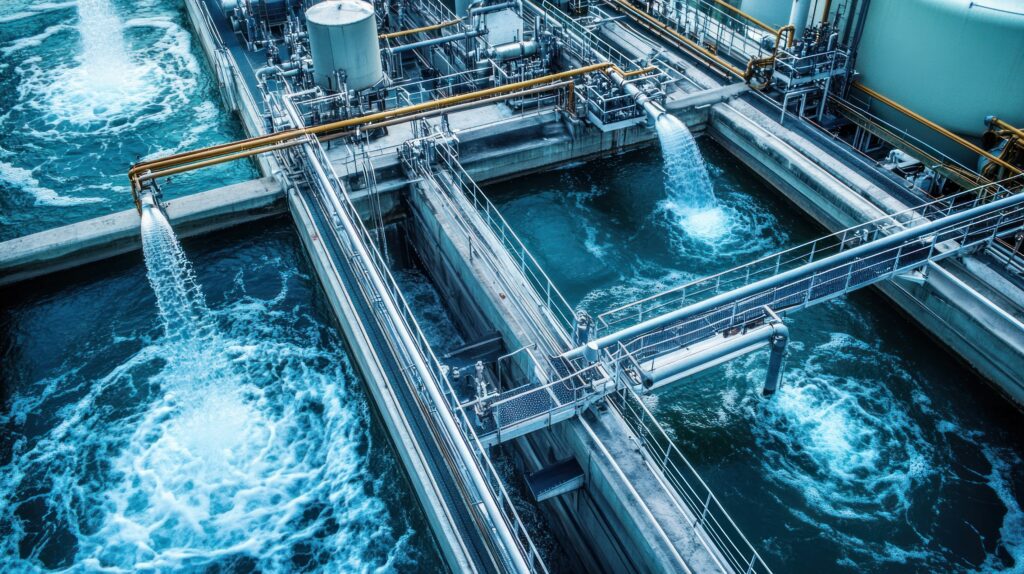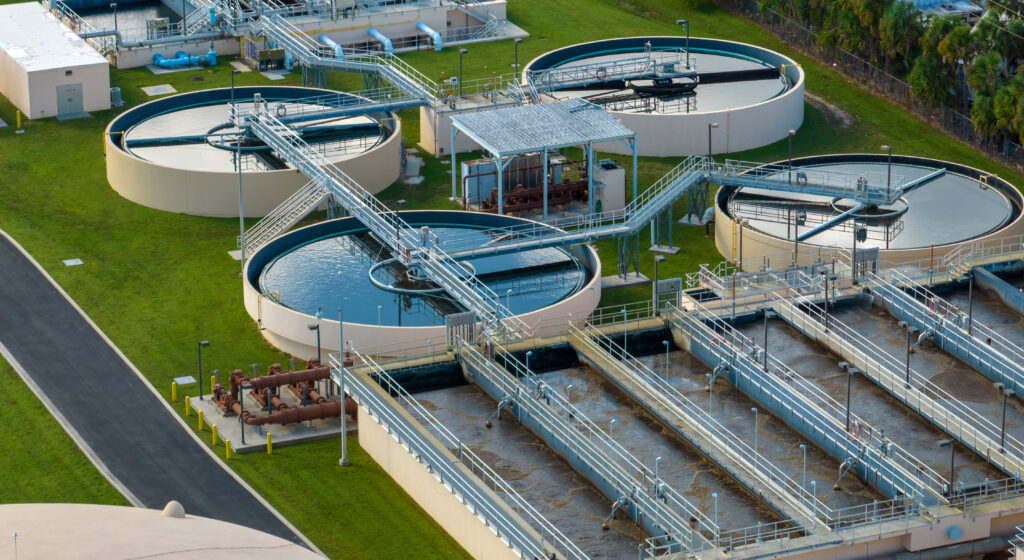Water and waste water
Both the extraction and supply of water and the collection
and wastewater treatment are among the central tasks
from cities, municipalities and various industrial sectors.
Water
Water is an indispensable resource for the population (food, hygiene) and industry (production, cooling, cleaning) and is an important basis for supply in modern societies.
Starting with extraction from wells or surface water, water is usually extracted, treated, tested and distributed in a highly automated and quality-controlled process.
From individual pumping stations, filter systems and purification stages, to large water reservoirs and centrally controlled pressure regulation in water networks, everything must work together seamlessly.
Software testing with WinMOD for each individual station and the interaction of all individual components in network operation, controlled by appropriate process control systems, ensure increasing operational reliability, also from the perspective of infrastructure security.


Waste water
Sewage disposal involves collecting, treating and returning water to the natural water cycle, as well as sorting and treating residual materials, for example in landfills and incinerators.
The actual commissioning of such plants is often difficult, as they are usually large-scale and have complex, decentralised instrumentation. However, since 2002, the use of WinMOD has resulted in significant savings in costs and commissioning times. As a result, virtual commissioning (VC) has become the standard procedure for planning and commissioning among leading plant operators.
WinMOD is currently used primarily in public wastewater management, i.e. in municipalities, cities and local authorities. The combination of public planning, approval procedures, tendering and awarding of contracts for technical plant construction, as well as the often delayed commissioning of automation systems, makes the use of WinMOD an indispensable component of project security.
WinMOD is used to perform individual test steps for decentralised subsystems, such as pumped storage plants or distribution stations, right through to complete sewage treatment plants. All stages of the water purification process are tested – from mechanical purification with rakes, sand traps, grease separators and primary settling tanks to biological purification in aeration and secondary settling tanks to chemical purification, for example through the addition of precipitants. Increasingly, processes for collecting and purifying new types of problematic substances, such as pharmaceutical residues, are also being taken into account.
Since many of these processes can only be tested to a limited extent in real life, virtual commissioning (VC) with WinMOD is a crucial tool for preparing, checking and securing the entire plant operation.
Further process automation solutions
Typical processes that carry out continuous or batch conversion of substances.
They are divided into main and auxiliary processes.
The aim is the economical and safe fabrication of basic materials or specialised products for all industrial sectors.
Similar production processes are used as in the chemical/pharmaceutical industry, but the core here is the use of microorganisms, cell cultures or enzymes for the fabrication of products.
In future, it will be used in various areas such as pharmaceuticals, green energy and green chemistry.
The focus is on processing, preserving and refining agricultural and raw materials. Typical processes include material- and energy-oriented product manufacturing, often combined with strict quality and hygiene standards.
All processes involved in the extraction and processing of raw materials (coal, ores, salts, earths) and their conversion into basic industrial products (steel, cement, gypsum, various other building materials). These processes are usually very energy-intensive.
Refrigeration machines for cooling and system components for cooling distribution and utilisation are a key factor in both industrial plants and building automation.
Energy generation plants based on fossil fuels (coal, gas, oil), nuclear power plants and increasingly promising variants based on environmentally friendly resources such as hydropower, solar, wind, tidal, etc., as well as energy distribution plants, are becoming increasingly highly automated with extreme demands on their availability.
Water supply, from extraction, treatment, storage and distribution, as well as wastewater disposal, including transport, storage and treatment for environmentally sound disposal, are fundamentally important for a modern society and its industry.
Technical installations in road transport (general traffic control, tunnels, bridges), rail transport (signalling and switch systems, signal boxes, etc.) and waterway transport (locks, weirs, ship lifts)
All areas of technical building equipment such as ventilation, heating, air conditioning, security and fire protection that aim to improve energy efficiency, comfort, safety and cost-effectiveness in buildings.
General shipbuilding for civil, technical and military use, offshore installations as bases for wind farms, gas and oil production facilities, and underwater stations.